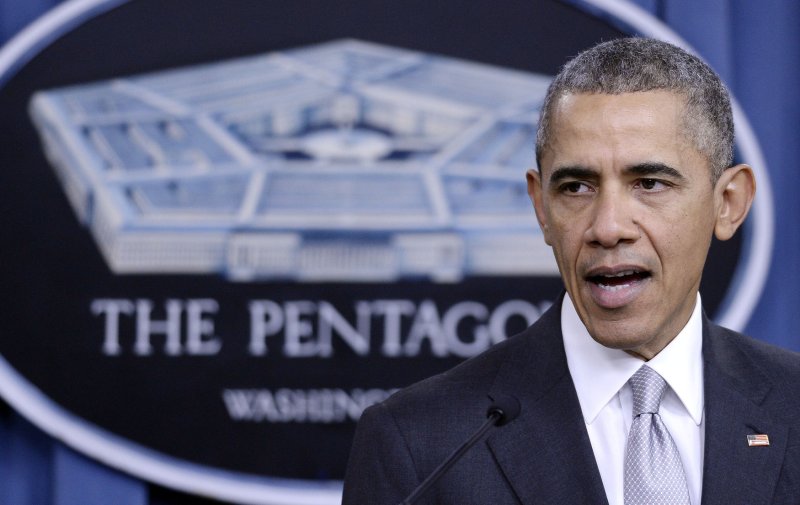President Barack Obama delivers a statement on the counter-Islamic State campaign in the Pentagon briefing room December 14 in Arlington, Va. Does he have the right strategy? Pool Photo by Olivier Douliery/UPI |
License Photo
Three days into the new year, here is a nagging question:
Suppose President Barack Obama has the right strategy to disrupt and destroy the Islamic State. Suppose that while the chances of any of the Arab or Islamic states in the coalition of 65 or in the newer Saudi coalition of 34 providing ground forces to combat IS are less than nil; the combination of air attacks, Iraqi and Kurdish operations to repel IS, and the anaconda-like stratagem of choking off IS's access to funds, foreign fighters entering and leaving the region and social media for recruiting and proselytizing converts over time works. Would success legitimize and validate the president's strategy?
Other points support this thesis.
While estimates of the total number of IS fighters can be notoriously inaccurate, if intelligence reports are to be believed, IS has about 30,000-40,000 fighters. A key question is how many are determined jihadis willing to die, and how many are part-time mercenaries who, if conditions turn against IS, will defect or disappear?
The recapture of Ramadi, 60 miles west of Baghdad, will be cited as a clear victory. But that battle needs closer analysis. In all probability, IS fighters numbered a thousand or so and possibly less. Their strength was threefold: holding civilians and non-combatants as hostages to confound any offensive; mining and booby-trapping large parts of the city to impede an attack; and extorting money from the residents to fund IS.
Hence, less than a head-to-head battle, the fight for Ramadi was by necessity a measured operation given IS's comparative defensive advantage with relatively few forces than then much larger numbers needed by Iraq's offensive to retake the city. The advantage of defense over offense means that the fight for Mosul, when it comes, will be longer, bloodier and a much greater drain on Iraq's resources than on IS's. However, this disparity could also suggest that IS's strategy is one of weakness, imitating North Vietnam's defeat of America by not losing.
If driven from Iraq, and -- a bigger if, if Russia and Iran, with Bashar al Assad's forces, finally lash out against IS -- its days could be numbered in months. But should IS's capital fall or IS evaporates, global tentacles still exist. However, as cutting off the head of a snake does not immediately kill the body, as with al-Qaeda and other terrorist groups, IS will become a lesser problem.
Unfortunately, if the above hypothesis is correct, the administration lacks a compelling argument to the public, and especially to its critics, to make its case. And an undeclared race is underway between the president's strategy showing real results and the presidential campaigns in which the candidates of both parties will be shriller in calling for doubling down in Iraq and Syria or withdrawing. That means criticism of the current strategy will grow harsher and stronger.
Of course, any strategy is only as good as its assumptions. The president's first assumption is that IS is far weaker than it appears—reinforcing his once calling IS the junior varsity. Second, because it is inherently weak, IS will eventually be destroyed. Third, Syria is IS's strategic center of gravity and the source of its power and recruitment.
Critics, including me, disagree. Assumptions of IS's weakness and whether it can be destroyed may or may not be overly optimistic. But what happens if they prove wrong? Perhaps IS is a fad that eventually disappears with no trace. But what if IS possesses the latent power of the Bolsheviks before Lenin's return to Russia in 1917 or the Nazi party in Germany before the 1933 accession to power? What is Plan B?
More to the point, Iraq is the reason for IS, metastasized by the relentless Shia-Sunni and Sunni-Shia violence against the other. The current Shia government in Baghdad believes IS can be defeated without much Sunni help. Hence, reconciling these bitter differences in Iraq may be as fruitless as resolving the Arab-Israeli-Palestinian conflict. And it is still unclear if Iraqi security forces can defeat and eject IS from Mosul and elsewhere.
The reality is that no viable, feasible or practical political alternative to the Obama plan exists other than incremental change. Neither the United States nor Arab and Muslim states will deploy substantial ground forces to Syria and several, including Saudi Arabia, do not share the U.S. view of the existential threat posed by IS.
Hence, all options are limited.
Obama's strategy at best will be a standoff. The tragedy or reality is that a standoff may be the least worst of outcomes.
_________________________________________________________________
Harlan Ullman is UPI's Arnaud de Borchgrave Distinguished Columnist; chairman of the Killowen Group that advises leaders of government and business, and senior adviser at Washington, D.C.'s Atlantic Council and Business Executives for National Security. His latest book is "A Handful of Bullets: How the Murder of Archduke Franz Ferdinand Still Menaces the Peace."















